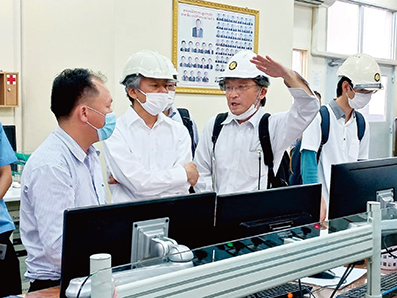(9) Securing Access to Resources and Energy
The number of people without access to electricity is estimated at approximately 760 million in the world and more than 46% of the population in Sub-Saharan Africa as of 2019. The lack of electricity, gas, and other energy supplies also leads to many issues, such as delay in industrial development, loss of employment opportunities, and a further increase in the poverty rate. Stable energy supply and appropriate consideration of the environment are essential since the global energy demand is expected to be expanded further in Asia and other parts of emerging and developing countries.
● Japan’s Efforts

A site visit to a power plant in Laos supported by Japan’s technical cooperation that aims to strengthen power system planning and operation for stable supply and power export (Photo: JICA)
Japan is working on the provision of support that enables modern energy supply and the stable supply of electricity for industrial development, in order to promote sustainable development in developing countries. In addition, Japan provides support for the establishment of environmentally friendly infrastructure (socio-economic infrastructure), such as energy-saving equipment and power generation facilities that utilize renewable energies (hydropower, solar photovoltaics, solar thermal, wind power, geothermal power, etc.).
For example, in 2021, in the Pacific Island countries located across expansive ocean areas with vulnerability to the influence of climate change, Japan assists grid-connected type renewable energy in becoming mainstream from the perspective of energy security and the realization of low-carbon or decarbonized societies. In the Dominican Republic, which highly relies on imported fossil fuels for its electricity supply, Japan supports LED lights use for streetlights on public roads across the country through ODA loans in order to help improve the energy efficiency of the country. With such efforts, Japan contributes to promoting energy conservation and reducing greenhouse gas emissions in the public sector (see “Stories from the Field 4”).
Japan also supports the Extractive Industries Transparency Initiative (EITI), which is a multinational cooperative framework to enhance the transparency of the flow of funds in the development of oil, gas, mineral, and other resources. Under this framework, extracting companies report the amount of payment to the governments of resource-producing countries, and these governments also report the amount of the revenue received from extracting companies to the EITI. In addition to 47 resource-producing countries and many supporting countries including Japan, extracting companies and NGOs are participating in the EITI. They are working together to ensure transparency of the flow of funds in order to prevent corruption and conflict, as well as to encourage responsible development that leads to growth and poverty reduction.
